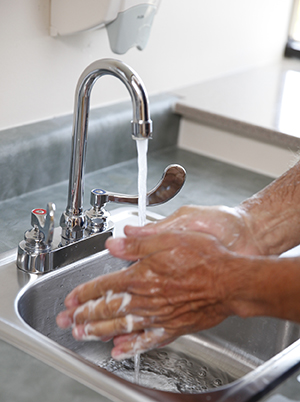VRE Infection
VRE (vancomycin-resistant enterococci) are germs that are resistant to certain germ-fighting medicines (antibiotics). They are specifically resistant to the antibiotic vancomycin. Normally, VRE does not cause infections in the community, but they are a common cause of infection in hospitalized or recently hospitalized patients. VRE can spread to anywhere in the body through your blood. The most common site of infection is the urinary tract. The most harmful sites are the heart valves or the brain.
What does this mean for you?
VRE germs travel on dirty hands, and then to countertops and other surfaces. If you’re in the hospital or other facility, your healthcare team is working hard to prevent germs from spreading. But they need your help. Tell your family members and visitors to wash their hands before they have contact with you and before they leave your room. And make sure they take other safety steps if required by hospital or other medical staff. This includes wearing gloves or gowns.

Who’s at risk?
People who are healthy typically don’t get VRE infection, even if they carry the germ in their bodies. But people at most risk of VRE infection are:
Others at risk are those who have:
-
The VRE germ in their system and become ill with something else
-
Used antibiotics for a long time
-
Been getting care at a healthcare facility
-
A weakened immune system
How healthcare staff fight infection
To keep infections from spreading, facility staff clean their hands before and after treating people. They may also wear protective gloves and gowns if needed. Staff also take the following safety steps:
-
Put people with VRE infection in private rooms when possible. Or put them in rooms with other people who have VRE.
-
Don't overuse antibiotics. Too much use can cause germs to resist some antibiotics.
-
Clean medical equipment and rooms with germ-killing cleaners.
-
Teach people with VRE and visitors the best ways to prevent infection.
What you can do as a patient
You can help stop germs from spreading, too. Cleaning your hands often is the best way to kill germs. VRE germs can be found in stool and urine in otherwise healthy people without causing any symptoms. The germs can sometimes enter the blood and make a person very ill. Even small amounts that can’t be seen can cause infection. These germs can also live on common surfaces, such as doorknobs. So wash your hands often, especially:
-
After using the bathroom
-
After touching a bandage
-
Before eating
Also, take antibiotics exactly as directed. This helps keep germs from growing resistant to the medicine.
Important: hand cleaning
Use plenty of soap and clean, running water.
-
Scrub hands for at least 20 seconds. Sing the ABC song or the Happy Birthday song. Wash your palms, backs of hands, under your fingernails, and in between fingers.
-
Rinse hands, letting water run down your fingers.
-
Dry hands well. Use a paper towel to turn off the faucet and open the door.
-
When using alcohol-based hand cleaners, rub hands until they are dry. Be sure the hand cleaner you use is made of at least 60% alcohol.
For family and friends
Family and friends must also clean their hands often when visiting someone at a healthcare facility. This means washing hands with soap and water before entering and after leaving a person’s room. Hands must also be washed after touching body fluids or bandages. Visitors may be asked to put on gowns and gloves as well. They should follow these instructions. If a hand sanitizer is used, it needs to contain 60% alcohol.
Take safety steps at home
VRE infection can spread at home, too. So be sure to take special safety measures while caring for someone. Follow the healthcare provider’s instructions carefully. To help keep germs from spreading:
-
Make sure the person understands how to correctly wash their hands and when to do it. Two key times for thorough handwashing include before cooking or eating and after using the toilet.
-
Change the person’s bedding once a week. Change it more often if it’s soiled with stool or body fluids. Wash and dry it alone in a washer and dryer. Use hot water with detergent and liquid bleach. Wear disposable gloves when handling soiled laundry.
-
Thoroughly clean surfaces, such as tabletops and sinks. Keep bathrooms, toilets, and bedside commodes clean. A mixture of 1/4 cup of bleach to 1 quart of water made daily works great for this.
-
Don’t let the person make food until the healthcare provider says it’s OK.
Note to caregivers at home
Wear disposable gloves when handling the person’s soiled laundry. Wash your hands after removing gloves. Never use only alcohol-based hand cleaners if hands look dirty. Use soap and water instead. Always wash hands after contact with the person. Remember to scrub under the fingernails and between the fingers.
Tell any healthcare providers including dentists that your loved one has VRE. It's important that providers know about the infection. Then they can prevent the infection from spreading.
When to call the healthcare provider
VRE infection can return or spread to others. Call the healthcare provider if you or those you have contact with have any symptoms of VRE infection. Symptoms include:
-
Diarrhea
-
Fever of 100.4°F ( 38°C) or higher, or as directed by the provider
-
Belly (abdominal) pain and cramping
-
Pain with urination
-
Wound infection